In May 2016, the Beijing Intellectual Property Office issued a ruling that Apple Inc. had violated the design patents of Chinese smartphone maker Shenzen Baili with its iPhone 6 and iPhone 6 Plus designs. The Chinese company alleged that Apple had copied its own Baili 100C smartphone.
When the Wall Street Journal attempted to track down Baili and inquire into its operations the following month, it found no signs that the company was still operational. Phone calls to the company went unanswered, the company websites had been deleted, and visits to three addresses in Shenzhen found no remaining company offices at those locations.
The company’s lawyers, however, insisted that it remained operational. Though it can be assumed this was mostly for the sake of extending its claims against Apple. Following the ruling last year in Beijing, Apple was given an injunction to stop selling its iPhone 6 models in that market, though it was able to quickly file an administrative appeal to sell these units again until further review by the court. Of course, by the time the court had reviewed its appeal, the iPhone 7 was already well into production and scheduled to ship over the new few months, resulting in minimal damage to the company’s gross profit margins.

Baili 100C (left) and iPhone 6 (right)
Then on Friday, The Intellectual Property Court ruled that Apple “[had] not infringed the design patent filed by the company Shenzhen Baili,” according to the verdict reported by People’s Court Daily. The court claimed that the iPhone 6 had features that “completely changed the effect” of the product, leaving it clearly distinguishable with Baili’s 100C and asserting the Chinese company’s claim had lacked a legal basis.
“Apple's iPhone 6 and iPhone 6 Plus have minor differences from Baili's 100C. The differences are so tiny that the average customer could not notice,” the ruling said. “So this case falls into the patent rights protection category.”
Baili originally took on Apple in December 2014 as a promising Chinese electronics firm based by Beijing Internet giant Baidu. The company was then hit by a series of public criticisms in its smartphone build quality in a market saturated with competitors vying for market share from Apple, Meizu, Huawei, Oppo, Vivo, Xiaomi, ZTE and others. Little information has been available about Shenzhen Baili, though research from China International Capital Corp. was able to find that the company had ¥29.6 million ($4.5 million) in 2013 operating income.
Some reports have noted that the latest IP decision reflects a tendency for China’s courts to not always rule in favor of its home market brands. Back in May, Apple faced the reverse outcome when the Beijing court ruled in favor of a local handbag company that had expressly printed the “iPhone” brand name on several of its leather goods.
Since the court decision, Shenzhen Baili’s legal team says it plans to appeal the recent patent ruling. Meanwhile, Apple has yet to respond for comment but is likely concerned about having to deal with another appeal against its operations in the Chinese market.




